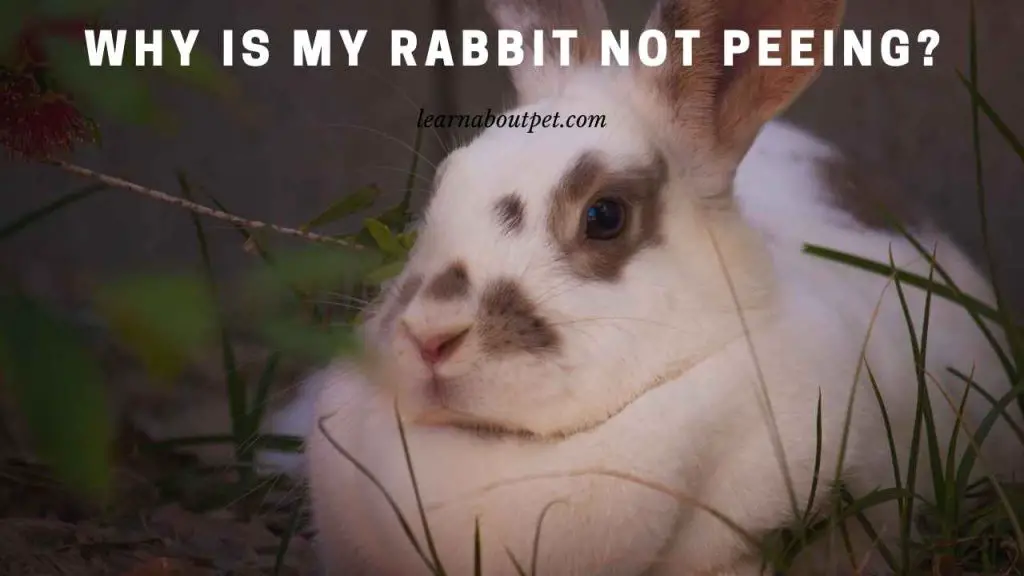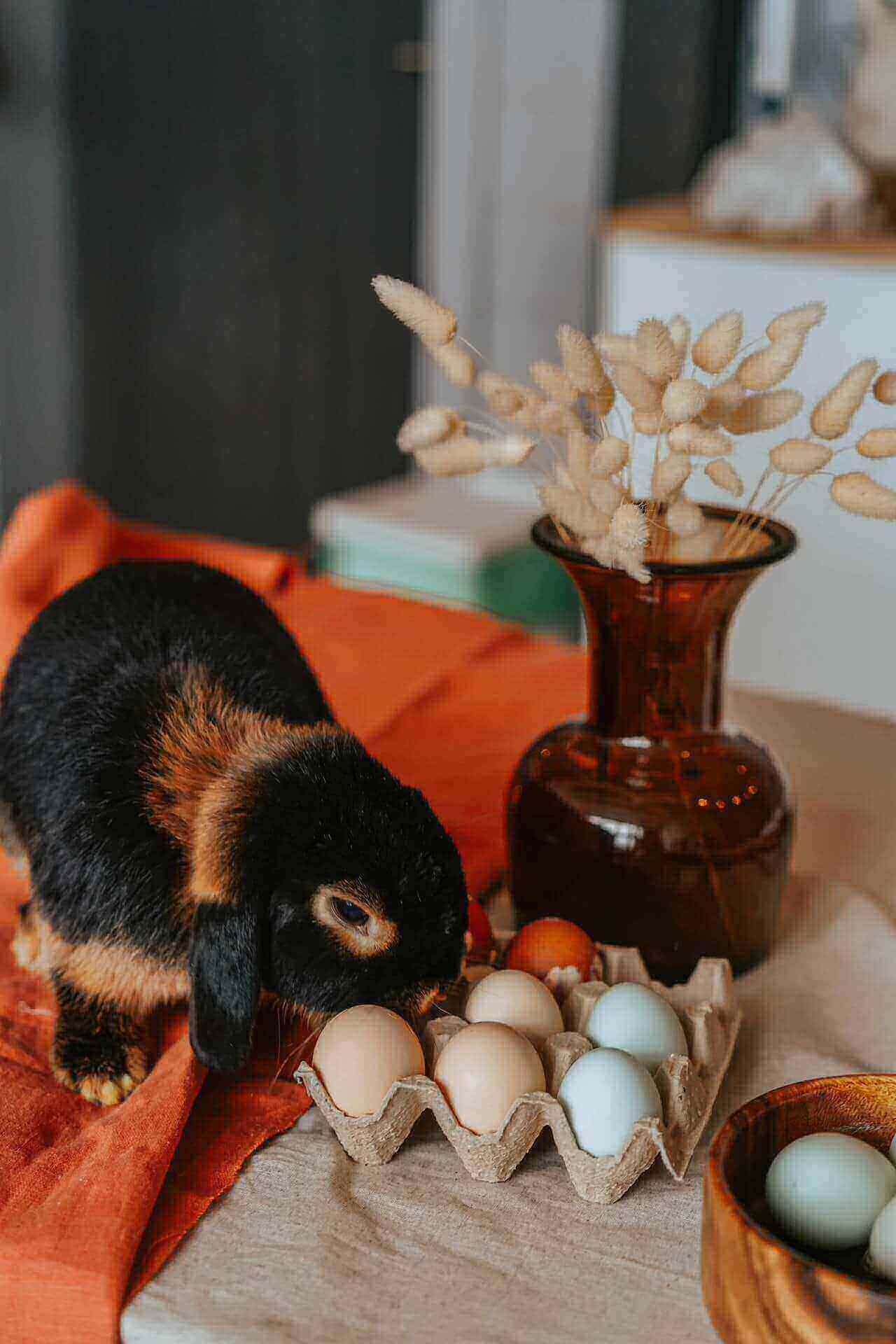It can be extremely disconcerting to learn that your rabbit is not peeing. Upon realizing that your rabbit is not peeing, you will certainly want to know the reason behind it. You will also want to know how this particular rabbit problem can be solved. Read on, for answers.
Why is my rabbit not peeing? It may be due to a urinary tract obstruction. Kidney problems may also cause a rabbit not to pee. And there are cases in which rabbits are unable to pee due to infections such as bacterial cystitis. Even intense stress may make a rabbit stop peeing.
You need to ask yourself how long the rabbit has not peed. When was the last time the rabbit peed? This can be helpful in figuring out the reason for the bunny not peeing.
You also need to consider what other symptoms the rabbit seems to be experiencing. These too can be helpful in identifying the specific reasons for rabbits not peeing.

The age of the rabbit can also be a relevant consideration. Thus a case of a baby bunny not peeing may have different implications from a case of an aged rabbit not urinating.
Ultimately, many people will tend to find a case of rabbit not urinating to be more alarming than, say, a case of a rabbit peeing excessively or rabbit not peeing properly.
Any scenario in which you find your pet rabbit not peeing needs to be taken with the seriousness it deserves.
Whether it is a baby rabbit not peeing or an aging rabbit not peeing, the underlying implications can be huge.
But once you understand the exact reason for the bunny rabbit not peeing, it becomes easier to resolve the issue.
How Often Do Rabbits Pee?
Before you start asserting that your rabbit is not peeing, it is important to understand how often rabbits normally pee.
As it turns out, rabbits normally pee between 2 and 8 times per day.
Thus if your rabbit pees 8 times a day, this may still be normal. Sure, the resultant bunny pee may look a lot: but it is still within the bounds of what we consider ‘normal’.
Sure, in that case, you may find yourself wondering, why does my rabbit pee so much? But 8 times per day is still within the normal range.
On the other end of the range, a rabbit may pee only 2 times per day, and this would still be ‘normal’.
Sure, in this case, you may find yourself asking, why is my rabbit not peeing very often? Or why is my rabbit not peeing a lot? But 2 times per day would still be within the bounds of what we consider ‘normal’.
But a situation in which, say, my rabbit hasn’t peed in 24 hours would indeed be very worrisome.
We said that a rabbit should at least pee twice per day. Therefore if it goes below 2 times per day, there is justification in asking, why is my rabbit not peeing?
In that situation, one can also justifiably ask, why isn’t my rabbit going to the bathroom often enough.
Thus in these matters, knowing how often do rabbits pee and poop is so important.
How Long Can Rabbits Go Without Peeing?
While facing a situation in which your rabbit is not peeing, you will almost certainly want to know how long rabbits can go without peeing.
Previously, in answering the how often do rabbits wee question, we saw that that is typically 2-8 times per day.
Then how long can rabbits go without peeing? The answer is a maximum of 24 hours. If a rabbit goes for 24 hours without peeing, that becomes an emergency.
Thus any case of rabbit not peeing for 24 hours should be handled as an emergency.
24 hours is the absolute maximum a rabbit can go without peeing.
It can be particularly worrisome if you find the rabbit drinking but not peeing for anything above 24 hours.
But even if the rabbit is neither drinking nor peeing, that is troublesome too.
All in all, if you had the how long can a rabbit go without peeing question, now you have the answer.
If you research on how long can a bunny go without peeing, the answers you find will tend to align with what we have given above.
Why Is My Rabbit Not Peeing?
There are several possible reasons for a rabbit not peeing.
Sometimes, the rabbit is unable to pee due to a urinary tract obstruction.
At other times, the rabbit is unable to pee due to kidney problems.
There are also cases in which the rabbit is unable to pee due to infections, such as bacterial cystitis.
Stress is also known to make a rabbit stop peeing, for a while at least.
The challenge arises when it comes to picking the specific reason for your rabbit not being able to pee.
To pick the specific reason, you often have to consider the other symptoms that the rabbit is having.
You may find the rabbit pooping but not peeing. This may point towards a urinary tract obstruction (which affects the peeing alone, without affecting the pooping).
You may find the rabbit not peeing or pooping. This may point to an infection or stress, which makes the rabbit unable to either pee or poop.
Or you may find rabbit tiny poops and not peeing. These may be indicative of a kidney issue.
It is still within the context of kidney problems that we find bladder stones and bladder sludge in rabbits, which often cause peeing problems.
In some instances, it may be a case of the rabbit not peeing regularly, as opposed to it stopping to pee altogether.
Even the latter scenario can be worrisome. After all, we often see rabbit owners worrying about their rabbit not peeing in litter box.
If a rabbit urinating outside litter box can be so worrisome, what about the rabbit being unable to pee regularly?
All in all, urinary tract obstruction, kidney problems, infections and stress are the common reasons for rabbits not peeing.
Let’s look at each in turn.
Urinary Tract Obstruction As A Possible Reason For Rabbit Not Peeing
If there is an obstruction anywhere in the rabbit’s urinary tract, then the rabbit will be unable to pee.
Whenever there is a case of a rabbit possibly having trouble peeing, urinary tract obstructions are worth considering.
These block the passage of rabbit urine.
You may find that the kidneys are producing healthy rabbit pee. But the pee is unable to come out, due to the obstruction.
Initially here, you will find the rabbit not urinating, eating normal.
But with time, the accumulation of urine within the body takes its toll. Eventually, the rabbit becomes lethargic, loses appetites and generally deteriorates in all ways.
The obstruction in question here can be due to a swelling somewhere. For instance, after a neutering or spaying operation, the rabbit may remain with a wound that then swells.
The swelling then blocks the urinary tract. Thereafter, the rabbit is unable to pass urine well.
Thus the end result can be a recently spayed rabbit not peeing. Or it may be that of a rabbit not peeing after neuter operation.
If you find a rabbit spayed not peeing, this sort of obstruction (as a result of swelling from the spaying wound) may be culpable.

Kidney Problems As A Possible Reason For Rabbit Not Peeing
If a rabbit has a kidney problem, it may be very hard for it to pee as expected.
It is the kidney that produces the pee.
Sometimes therefore, a kidney problem will affect the rabbit’s urine production.
You therefore find that the rabbit is not producing urine. Therefore it has nothing to pee. The whole thing can be very frustrating: often to a point where you start asking yourself, how do I make my rabbit pee?
If kidney problems don’t make a rabbit unable to pee, they sometimes make a rabbit pee too much.
Thus if you were wondering, why does my rabbit pee so much, then it may be due to a kidney problem as well.
Clearly, kidney problems can have a paradoxical effect, when it comes to rabbit peeing.
Do rabbits sometimes become unable to pee due to kidney problems? The answer is ‘yes’.
Conversely, do rabbits pee a lot in some cases due to kidney problems? The answer is still ‘yes’.
Thus in a case of a rabbit not peeing at all, peeing too little or peeing too much, the problem may be in the kidney.
Infection As A Possible Reason For A Rabbit Not Peeing
An infection can make it impossible for a rabbit to pee.
For instance, a rabbit with bacterial cystitis may be unable to pee.
Ironically, you may also find a rabbit peeing a lot (more than normal) due to an infection. Thus a rabbit with cystitis sometimes urinates more – not less – than is normal.
All in all, in any case of a rabbit being unable to urinate, it would be worthwhile to consider infections such as cystitis.
Stress As A Possible Reason For Rabbit Not Peeing
Rabbits, being prey animals, are very prone to intense stress reactions.
Stress can induce very big behavioral changes in rabbits.
Sometimes, you may find a bunny not pooping or peeing due to stress.
Actually in exploring any case of a rabbit not pooping or peeing, this is one of the first things to consider.
Stress can also make a rabbit to stop peeing in its litter box.
Thus if you were wondering, why is my rabbit not peeing in his litter box anymore or generally, why do rabbits pee outside the litter box, stress may be the explanation.
Sometimes, the stress in question may simply be that which comes from the rabbit continually finding its litter box or living quarters dirty.
The rabbit normally won’t pee or poop in a particularly dirty place. Therefore it decides to hold up its pee/poop. That in turn makes the rabbit even more stressed.
The end result can be a situation in which the rabbit is completely unable to pee.
Rabbit Not Peeing – What To Do?
If a rabbit is not peeing for more than 24 hours, then that is an emergency. You need to rush the rabbit to a vet. This should ideally be a vet who is familiar with small, unique pets such as rabbits.
The vet will then examine the rabbit, and maybe carry out tests, to identify the underlying problem.
In case the rabbit won’t pee due to a urinary obstruction, the vet will figure out the reason behind the obstruction. Then the vet will initiate measures to eliminate the obstruction.
There are cases in which the vet may recommend expressing the dog’s urine in the meantime.
In case the rabbit won’t pee due to kidney problems, the vet may recommend certain measures to somewhat resolve the issue.
Dietary changes, more exercises and better hydration can be helpful.
If the rabbit won’t pee due to an infection, then the vet will figure out what infection it is. Then he will normally prescribe the appropriate medication, to resolve it once and for all.
In case the rabbit won’t pee due to stress, the first step will be to identify the triggering stressors. Then get rid of them, in order to make the dog comfortable enough to start peeing and doing all other things normally.
Final Verdict – Rabbit Not Peeing
There are several things that can make a rabbit stop peeing.
If a rabbit has a urinary tract obstruction, then it may not be able to pee. The rabbit may be able to produce urine, but due to the obstruction, the urine can’t come out.
A rabbit that has a kidney problem may also not be able to pee. In this case, on account of the kidney problem, the rabbit may be unable to produce urine. Therefore it has nothing to pee.
The presence of bladder stones and bladder sludge can also bring about peeing problems in rabbits.

A rabbit with an infection such as bacterial cystitis may have difficulties peeing. In the worst cases, such rabbits may stop peeing altogether.
Stress is another thing that can make a rabbit stop peeing. If a rabbit is intensely stressed, it may get to a point at which it is unable to pee normally.
A rabbit should pee at least 2 times per day (in a 24 hour cycle). If you find a rabbit peeing less than 2 times per day or not peeing at all, then this would be an emergency that warrants urgent veterinary attention.
As a pet lover, make sure to learn about pet more and give your pet dog a good and comfortable life!

Welcome to Learn About Pet. My name is Rajkumar Ravichandran and I love all pets, travel, and amazing food. I write about my passion and personal experience caring for multiple pets in this blog! ❤️
Post Disclaimer
DISCLAIMER: THIS BLOG OR WEBSITE, "Learn About Pet", DOES NOT PROVIDE YOU WITH MEDICAL ADVICE AND IS NOT A SUBSTITUTE FOR MEDICAL ADVICE. ALWAYS GET IN TOUCH WITH YOUR PERSONAL VETERINARIAN AND USE INFORMATION HERE AS GENERAL ADVICE.
The information, including but not limited to, text, graphics, images and other material contained on this website are for informational purposes only. No material on this site is intended to be a substitute for professional veterinary advice, food recommendation, diagnosis, or treatment. Always seek the advice of your veterinarian or other qualified health care provider with any questions you may have regarding a medical condition or for pet food related questions.







